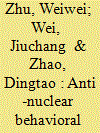|
|
|
Sort Order |
|
|
|
Items / Page
|
|
|
|
|
|
|
| Srl | Item |
| 1 |
ID:
150378


|
|
|
|
|
| Summary/Abstract |
This study explored the key factors underlying people's anti-nuclear behavioral intentions. The protective action decision model and the heuristic–systematic model were integrated and adapted from a risk information perspective to construct a hypothetical model. A questionnaire study was conducted on a sample of residents near the Haiyang Nuclear Power Plant, which is under construction in Shandong Province, China (N=487). Results show that, as expected, perceived knowledge is vital in predicting people's information insufficiency, information seeking, systematic processing, and risk perception. Moreover, the inverted U relationship between perceived knowledge and anti-nuclear behavioral intentions is indicated in the study. Information insufficiency and information seeking also significantly predict systematic processing. Furthermore, people's behavioral intentions are motivated by risk perception but fail to be stimulated by systematic processing. Implications and recommendations for future research are discussed.
|
|
|
|
|
|
|
|
|
|
|
|
|
|
|
|
| 2 |
ID:
125110


|
|
|
|
|
| Publication |
2013.
|
| Summary/Abstract |
In recent years, a growing body of research has set out to examine the role that emotions play in shaping political attitudes and behaviors regarding terrorism. However, one major issue that is generally overlooked is whether the thematic relevance of emotive triggers leads to differential effects on people's reactions to international terrorism. Specifically, does anger-regardless of its source-tend to drive people towards supporting an aggressive foreign policy option to counter terrorism, or do the thematic underpinnings of anger (i.e., the specific contents that trigger this particular emotion, such as watching a news story about a recent terrorist attack) matter vis-à-vis the policy choice? To address this gap, this study experimentally examines the impact of anger-induced by thematically relevant versus irrelevant emotive triggers-on people's cognitive processing and foreign policy preferences regarding international terrorism. Overall, we find that the induction of anger via thematically relevant emotive triggers leads to a higher tendency for selecting a military option, a lower amount of information acquisition, and a shorter processing time in response to terror-related incidents.
|
|
|
|
|
|
|
|
|
|
|
|
|
|
|
|
| 3 |
ID:
040882


|
|
|
|
|
| Publication |
London, Macmillian, 1971.
|
| Description |
xi, 207p.Hbk
|
| Standard Number |
333129385
|
|
|
|
|
|
|
|
|
|
|
|
Copies: C:1/I:0,R:0,Q:0
Circulation
| Accession# | Call# | Current Location | Status | Policy | Location |
| 008380 | 658.4013/EIL 008380 | Main | On Shelf | General | |
|
|
|
|
|
|
|
|
|